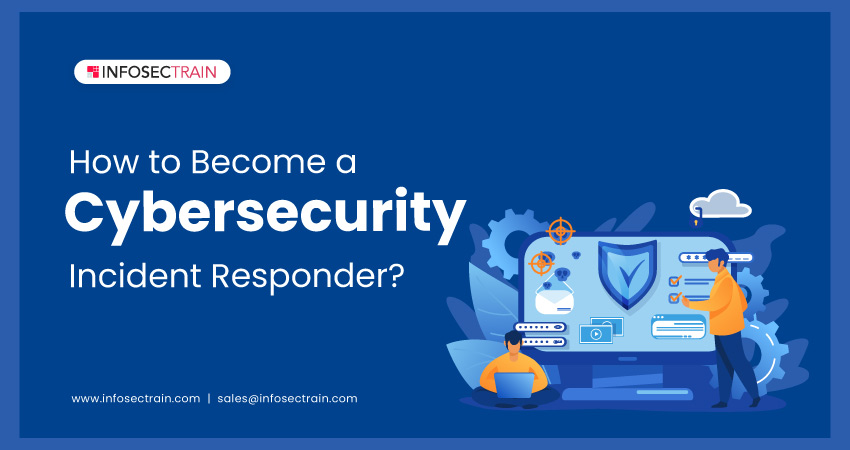How to Become a Cybersecurity Incident Responder?
Today the technology sector has become one of the most powerful and prominent for small to large businesses. Maintaining the security of any business’s systems, databases, and networks that depend on technology is crucial because, nowadays, cyberattacks are becoming more common that are harming businesses. Therefore, businesses employ a Cybersecurity Incident Responder to respond quickly to any cybersecurity incidents or threats and maintain the integrity of the data, network, and overall IT infrastructure.

In this article, you will understand how to become a Cybersecurity Incident Responder, but first, you need to understand what that role entails. Let’s get started.
Cybersecurity Incident Responder
A Cybersecurity Incident Responder is a professional responsible for immediately identifying, investigating, responding to, and managing cybersecurity incidents that occur within an organization. Their primary role is to detect, analyze, and mitigate data breaches, cyber-attacks, and other cybersecurity incidents quickly and effectively to minimize the damage caused to an organization’s assets, including data, networks, and systems. The Cybersecurity Incident Responder is responsible for coordinating the incident response process and collaborating with other members of the organization’s IT and security teams to develop and implement incident response plans, conduct forensic investigations, and apply remediation measures to prevent future incidents.
How to Become a Cybersecurity Incident Responder?
You can follow the tips mentioned below to become a Cybersecurity Incident Responder.
1. Acquire the skills required to become a Cybersecurity Incident Responder:
Let us look at some vital skills you need to develop to become a Cybersecurity Incident Responder.
Soft skills:
- Communication: You must have good verbal and written communication skills to facilitate cooperation and coordination, which is a key to good incident response. Moreover, excellent communication facilitates the translation of highly technical information into reports that are easily understood by technical and non-technical stakeholders, including senior management, legal teams, and law enforcement agencies.
- Problem-solving: You must have a solid problem-solving mindset to analyze complex situations, determine the leading cause of an incident, and develop effective strategies to contain and resolve the problem.
- Collaboration: Cybersecurity Incident Responders regularly work with multiple teams to resolve a security issue; therefore, collaboration is crucial to successful teamwork. It enables them to successfully collaborate with others to plan a response, share expertise, establish relationships, solve complex problems, and continuously improve their operations.
- Adaptability: Cyber threats and attacks continuously evolve and become more sophisticated as cybercriminals’ skills develop. You must be able to adapt to the ever-changing circumstances and stay one step ahead of hackers to mitigate the impact of an attack effectively.
Technical skills:
- Operating systems and networking: You must be proficient with different operating systems, such as Windows, Linux, and macOS, as well as networking protocols and technologies, such as TCP/IP, DNS, and HTTP, to track the origin of attacks and identify compromised systems.
- Forensic knowledge: You need to have a solid understanding of forensic principles and practices to investigate incidents effectively and to ensure that evidence is properly collected and preserved for analysis. You must be proficient with several computer forensic tools and software, such as EnCase, FTK, Cellebrite, XRY, and others, to recover data and identify the source of an incident. As well as you must have an understanding of legal and regulatory requirements related to evidence handling.
- Network traffic analysis: You must be competent in analyzing the network’s traffic because most cybersecurity incidents originate from the network.
- Intrusion detection: You must be fully competent in using intrusion detection technologies and be skilled and updated on the best practices for intrusion detection.
- Incident response tools: You must have a good understanding of incident response tools and technologies, such as IDS, SIEM systems, and EDR solutions.
- Cloud security: You must have the ability to understand and secure cloud-based systems and services, such as Amazon Web Services (AWS) and Microsoft Azure.
2. Get the required education:
You must have a bachelor’s or master’s degree in computer science, computer forensics, information technology, information assurance, cybersecurity, or other related fields.
3. Get the required experience:
To become a Cybersecurity Incident Responder, you must have two to three years of relevant work experience in computer science, computer forensics, computer engineering, computer investigations, cybersecurity, or network administration. In addition to this, you must have an excellent working knowledge of Linux, Windows CLI, etc.
4. Acquire certifications to become a Cybersecurity Incident Responder:
The first and foremost crucial requirement to become a Cybersecurity Incident Responder is to have a basic understanding of cybersecurity. You must be familiar with fundamental cybersecurity concepts, attack methods, protection laws, network security measures, and more.
So if you are new to cybersecurity, below are the certifications that will help you obtain fundamental cybersecurity knowledge.
TRAINING CALENDAR of Upcoming Batches For CEH v13
| Start Date | End Date | Start - End Time | Batch Type | Training Mode | Batch Status | |
|---|---|---|---|---|---|---|
| 11-May-2025 | 28-Jun-2025 | 09:00 - 13:00 IST | Weekend | Online | [ Close ] | |
| 31-May-2025 | 06-Jul-2025 | 19:00 - 23:00 IST | Weekend | Online | [ Open ] | |
| 07-Jun-2025 | 13-Jul-2025 | 09:00 - 13:00 IST | Weekend | Online | [ Open ] | |
| 21-Jun-2025 | 27-Jul-2025 | 19:00 - 23:00 IST | Weekend | Online | [ Open ] | |
| 06-Jul-2025 | 16-Aug-2025 | 09:00 - 23:00 IST | Weekend | Online | [ Open ] |
Once you have the foundational knowledge of cybersecurity, then you can go deep with other professional certificates that can be used to demonstrate the abilities and expertise required to be a successful Cybersecurity Incident Responder. Some of them include the following:
5. Cybersecurity Incident Responder career opportunities
Once you have obtained the above certificates and the required practical experience, several job opportunities will open up for you. A few of the job opportunities are as follows:
- Cybersecurity Incident Responder
- Incident Response Engineer
- Computer Security Incident Response Team (CSIRT) Engineer
- Computer Security Incident Response Team (CSIRT) Manager
- Computer Network Defense (CND) Incident Responder
- Security Operations Center (SOC) Analyst
- Incident Response Manager
6. Know the average salary of a Cybersecurity Incident Responder
It is good to know how much a Cybersecurity Incident Responder makes on average before you decide to pursue this career to evaluate whether the job is financially rewarding enough. The average annual income for a Cybersecurity Incident Responder in the United States is $79,377, according to Glassdoor. However, the salary ranges vary on many criteria, including company size, location, experience, certifications, and skills.
You can also refer to the related blog: Top 20 Interview Questions of an Incident Responder
How can InfosecTrain help you?
The increasing demand for cybersecurity professionals in the digital environment we live in has established several career opportunities. Cybersecurity Incident Responder is one of the first and foremost fastest-growing employment roles. InfosecTrain’s ECIH and CySA+ certification training courses will help you develop the necessary expertise to pursue a career in this role. InfosecTrain is a well-known IT security training and consultancy company focusing on a broad range of IT security domains like cybersecurity, cloud security, data privacy, and more.










 1800-843-7890 (India)
1800-843-7890 (India)